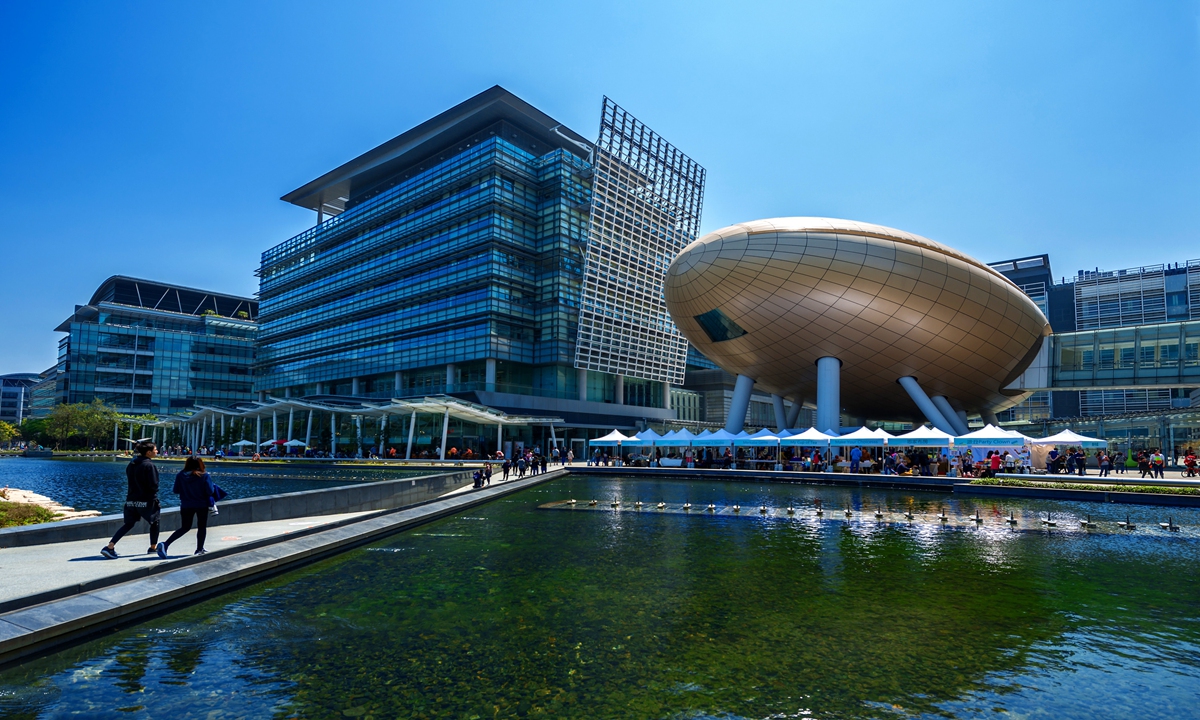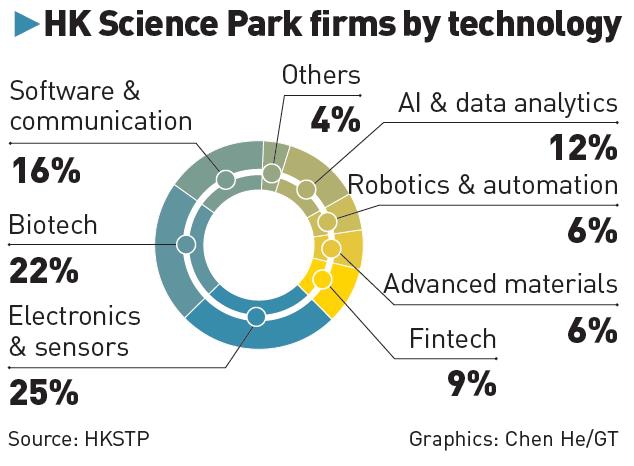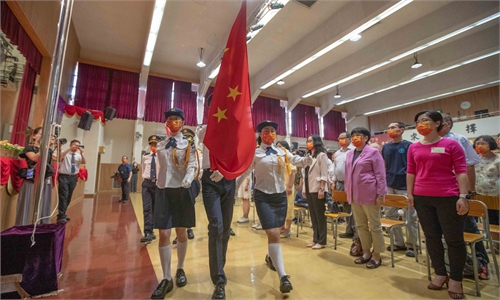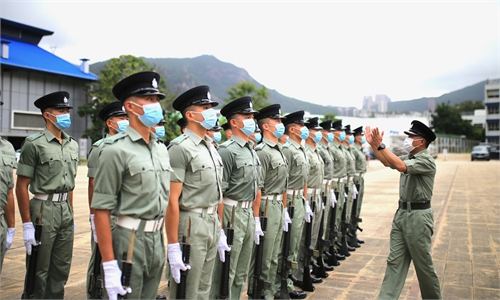Inspired by Xi's visit, HK sci-tech firms eye closer GBA cooperation
Entrepreneurs eye strengthened integration across GBA, closer cooperation with mainland counterparts

Hong Kong Science Park File photo: VCG
Enterprises from the Hong Kong Science Park said they have been inspired by President Xi Jinping's recent visit to Hong Kong and look forward to closer technology cooperation with cities in the Guangdong-Hong Kong-Macao Greater Bay Area (GBA) as Hong Kong is developing into a leading innovation and technology hub.
The Hong Kong Special Administrative Region (HKSAR) government should give full play to the role of technological innovation in supporting and leading economic development, Xi said during his inspection tour of the Hong Kong Science Park on Thursday, the Xinhua News Agency reported.
When talking with academicians, researchers, and youth representatives from innovation enterprises, Xi called on Hong Kong to better cooperate with mainland cities located in the GBA, strengthen the collaborative development of enterprises, universities and research institutions, and strive to build the bay area into a global hub for scientific and technological innovation.
Solid foundation
The Hong Kong Science Park was established by the Hong Kong Science and Technology Parks Corporation (HKSTP) in 2002. The establishment of the park was aimed at driving the growth of Hong Kong's high value-added industries and at creating industrial clusters in major technology focuses, such as electronics, IT and telecommunications, precision engineering and biotechnology.
The science park is the largest research and development (R&D) and business incubation base in Hong Kong, and is currently home to more than 1,100 enterprises and 17,000 innovators.
Kinson Chan, CEO of eSIX Limited, a software provider for 5G industrial applications, told the Global Times on Friday that Hong Kong's input into the innovation economy over the past three to four years has been equivalent to the past two decades and in this context President Xi's Thursday visit to the science park is "very encouraging and morale boosting."
Chan, whose company's products now serve major ports in the mainland, said Hong Kong has a global platform and living environment that makes it easier to attract world-class talent. He said that scientists and engineers from Pakistan and India now work shoulder by shoulder in his company.
"Closing the gap with advanced Western technology requires the smartest brains from all over the world, and Hong Kong, where East meets West, could be the global platform for this job," Chan said.
Hong Kong ranked 10th among the 132 economies in global innovation inputs in 2021, according to Global Innovation Index (GII) 2021 published by World Intellectual Property Organization (WIPO).

Hong Kong Science Park firms by technology Graphic: GT
GBA integration
"Technology and innovation is the bright direction that President Xi has pointed out for Hong Kong to facilitate Hong Kong's future economic transformation and integration into the GBA," said Shang Hailong, general manager of SenseTime Hong Kong, a leading artificial intelligence (AI) software company located in the science park.
"As a tech industry player in Hong Kong, we must earnestly comprehend Xi's important speech, and strive to turn Hong Kong's advantage into the intelligent manufacturing development in the GBA and firmly hold the technology independence in our own hands," Shang told the Global Times on Friday.
Many mainland tech giants such as Huawei and Tencent have already set up subsidiaries, research centers or joint labs with Hong Kong universities to accelerate R&D of new products.
As stated in the country's 14th Five-Year Plan (2021-25), the central government supports Hong Kong to cement its four traditional roles in international finance, shipping, trading and international legal and dispute resolution services in the Asia-Pacific region, while encouraging the city to explore four new roles such as serving as international innovation and technology center among other directions involving the services sector.
In addition, Hong Kong will develop a new tech hub in its northern region to deepen cooperation with adjacent Shenzhen in Guangdong Province and integrate Hong Kong into the overall development of the country, according to the 2021 HKSAR annual policy address.
The total number of jobs in the Northern Metropolis - as the HKSAR government names the would-be tech hub - will increase substantially from 116,000 to about 650,000, including 150,000 innovation and technology industry-related jobs.
"In this regard, SenseTime has caught up with a good opportunity," Shang said.
Vitaly Pentegov, CEO of UrbanChain Group, a company based in the science park, also looks forward to a deeper integration of Hong Kong's innovation sector into the national development plan, and he believes the new plans would take the integration of GBA cities to a new level.
"The GBA and Northern Metropolis Development Strategy implied easier commuting, cross-border transactions and acknowledgement of technology exchange procedures," Pentegov told the Global Times on Friday.
His company provides software and hardware solutions to AI-driven parking, property and mobility solutions.
"My company is interested in the GBA market, and we are waiting for quarantine restrictions to be eased, so we can schedule the visit to our clients and prospects in Shenzhen right away," Pentegov said.

Innovation Photo: VCG
Strengths
According to the GII 2021 report released by WIPO, HKSAR performed best in creative outputs, market sophistication and infrastructure, ranking top 10 in the world.
Hong Kong has significant advantages in talent resources. By combining talent resources with high-end industries, incunabular R&D projects could be first rolled out in Hong Kong and then by taking advantage of the integrated development of the GBA, AI technology could be industrialized and commercialized, and simultaneously enter the mainland and international markets, Shang said.
Hong Kong's Innovation and Technology Bureau said in a statement sent to the Global Times last week that the city possesses strong R&D and innovation capabilities, with forward-looking R&D talent as well as the ability to break through "from zero to one."
"We are more confident than ever that we could fully collaborate in the development of the GBA by leveraging the complementary advantages among different cities in the GBA, and develop the GBA into an international information technology hub," the Hong Kong Innovation and Technology Bureau said, noting that it will leverage "Hong Kong's strengths" to serve the needs of the country.
Moreover, observers noted that Hong Kong excels in basic R&D and has a high level of internationalization, but is falling short in translating research results into commercial success. By contrast, Guangdong Province has been home to a complete industrial chain, so if the two regions' collaboration is synergized, it could generate a multiplying effect.
"Some of Hong Kong's traditional functions have been waning, but the city is ideally positioned to shoulder a bigger responsibility in China's tech upgrade amid an increasing complicated external environment. It's a task that Shenzhen may not be able to assume but for which Hong Kong could act as an 'amplifier,'" an executive from a Shenzhen-based leading tech firm, who spoke on condition of anonymity, told the Global Times on Sunday.



